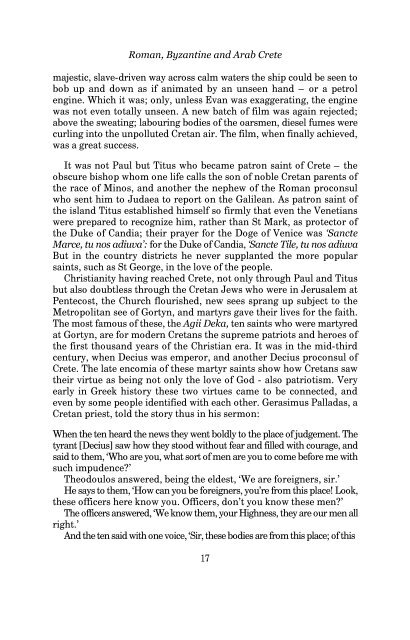free download here - Michael Llewellyn-Smith
free download here - Michael Llewellyn-Smith
free download here - Michael Llewellyn-Smith
Create successful ePaper yourself
Turn your PDF publications into a flip-book with our unique Google optimized e-Paper software.
Roman, Byzantine and Arab Crete<br />
majestic, slave-driven way across calm waters the ship could be seen to<br />
bob up and down as if animated by an unseen hand – or a petrol<br />
engine. Which it was; only, unless Evan was exaggerating, the engine<br />
was not even totally unseen. A new batch of film was again rejected;<br />
above the sweating; labouring bodies of the oarsmen, diesel fumes were<br />
curling into the unpolluted Cretan air. The film, when finally achieved,<br />
was a great success.<br />
It was not Paul but Titus who became patron saint of Crete – the<br />
obscure bishop whom one life calls the son of noble Cretan parents of<br />
the race of Minos, and another the nephew of the Roman proconsul<br />
who sent him to Judaea to report on the Galilean. As patron saint of<br />
the island Titus established himself so firmly that even the Venetians<br />
were prepared to recognize him, rather than St Mark, as protector of<br />
the Duke of Candia; their prayer for the Doge of Venice was ‘Sancte<br />
Marce, tu nos adiuva’: for the Duke of Candia, ‘Sancte Tile, tu nos adiuva<br />
But in the country districts he never supplanted the more popular<br />
saints, such as St George, in the love of the people.<br />
Christianity having reached Crete, not only through Paul and Titus<br />
but also doubtless through the Cretan Jews who were in Jerusalem at<br />
Pentecost, the Church flourished, new sees sprang up subject to the<br />
Metropolitan see of Gortyn, and martyrs gave their lives for the faith.<br />
The most famous of these, the Agii Deka, ten saints who were martyred<br />
at Gortyn, are for modern Cretans the supreme patriots and heroes of<br />
the first thousand years of the Christian era. It was in the mid-third<br />
century, when Decius was emperor, and another Decius proconsul of<br />
Crete. The late encomia of these martyr saints show how Cretans saw<br />
their virtue as being not only the love of God - also patriotism. Very<br />
early in Greek history these two virtues came to be connected, and<br />
even by some people identified with each other. Gerasimus Palladas, a<br />
Cretan priest, told the story thus in his sermon:<br />
When the ten heard the news they went boldly to the place of judgement. The<br />
tyrant [Decius] saw how they stood without fear and filled with courage, and<br />
said to them, ‘Who are you, what sort of men are you to come before me with<br />
such impudence?’<br />
Theodoulos answered, being the eldest, ‘We are foreigners, sir.’<br />
He says to them, ‘How can you be foreigners, you’re from this place! Look,<br />
these officers <strong>here</strong> know you. Officers, don’t you know these men?’<br />
The officers answered, ‘We know them, your Highness, they are our men all<br />
right.’<br />
And the ten said with one voice, ‘Sir, these bodies are from this place; of this<br />
17


